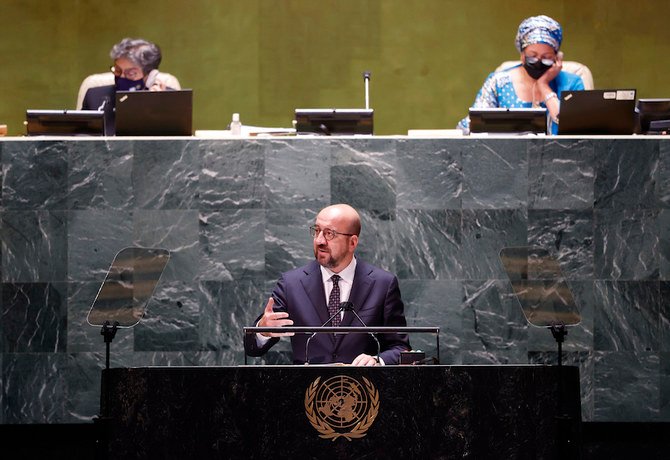The president of the European Council has outlined the EU’s ambition for strategic autonomy, which he said would be used in pursuit of a fair and more secure world.
“We have values to promote, citizens to protect and interests to defend,” Charles Michel told delegates at the UN General Assembly on Friday.
“In this spirit, we’re developing the strategic autonomy of the European Union, including in our capacities of security and defense.” This effort, he said, would allow the bloc to “shore up” its “positive influence” abroad.
The European Council is an EU body composed of the heads of each member state, and it defines the overall strategic and political objectives of the union.
Michel listed the conflict in Ukraine and the weaponization of migrants by Belarus as critical challenges that a strategically autonomous EU would be able to more effectively address.
“The recent uptick in violence in the Middle East was the first reminder of the overriding need to resume peaceful dialogue toward a two-state solution with Israel and Palestine,” he said.
He made clear, however, that European strategic autonomy would not come at the expense of the bloc’s relationship with the US.
“This is an alliance that’s anchored in our democratic values, and it’s a staunch pillar of our security and stability in the world,” he said. “Stronger allies make for a stronger alliance, in transparency and loyalty.”
In keeping with many of the addresses at the 76th UNGA, which began last week, Michel pledged that the EU would continue the fight against climate change, and he urged others to follow in this endeavor.
“Today, we face another turning point in human history because we’re entrenched in another war, a global war. This global war has no opposing sides, no armies … yet this war destroys lives, brings countries to their knees and brings unimaginable suffering to families. I’m talking about the war we humans have waged against nature,” he said.
“It’s time to stop waging war against nature. It’s time for humans to sign an armistice with nature … A fairer, more secure world is a world free from the climate threat.”
But Michel acknowledged that the impacts and causes of climate change are not evenly distributed globally.
“We’re aware that not all are equal in the race against time vis-a-vis global warming,” he said. “Industrialized countries shoulder particular responsibility in supporting developing countries.”
Michel said “few have honored their word” regarding the 2019 pledge by developed countries to provide $100 billion per year to help developing countries fight global warming.
“From 2013 to 2019, the EU and member states have dispersed €127 billion ($148.8 billion) — that’s one-third of the total in the commitment — and we call upon other partners to honor their pledges as well. It’s a question of trust and a question of equality,” he added.
“Transforming the world, making it fairer, more secure, and guaranteeing dignity for every person — that’s the promise, that’s the pledge of the United Nations. It’s incumbent upon all of us to meet this promise, to honor the commitment, to rise to the ambition.” In these goals, he said: “You can count on the European Union.”

